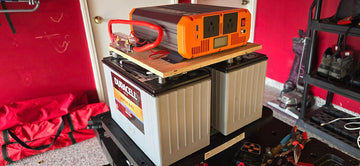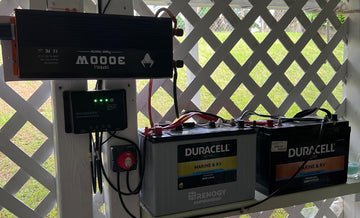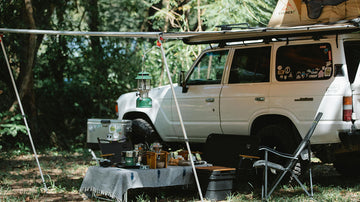With its unique charm, RV travelling has become a popular choice for modern families to pursue freedom and adventure. While enjoying the fun of RV travelling, the performance and condition of the battery, as the core of the RV's power supply system, is directly related to the safety and comfort of the trip. This article will focus on the topic of RV Battery Voltage Chart, discussing in-depth the types of RV batteries, voltage monitoring, recommended brands, and maintenance and inspection tips, aiming to help readers better manage and maintain their RV batteries.
What is an RV Battery
An RV battery is a battery system that is used to power the interior of an RV and is typically used to power equipment such as lights, refrigerators, air conditioners, and other appliances. It is an integral part of the RV and determines the self-sufficiency and ease of use of the RV. Typically, RV batteries use rechargeable batteries, which means they can be recharged via a generator or an external power source.
What type of batteries are typically installed in RVs
The most common types of batteries found in RVs include lead-acid and lithium batteries.
- Lead-acid batteries: Lead-acid batteries are the traditional choice, being relatively inexpensive and readily available, but they do have drawbacks, such as heavy weight, shorter life cycles and the need for frequent maintenance. There are two main types of lead acid batteries: starter batteries and deep cycle batteries. Deep cycle batteries are suitable for motorhomes as they are able to recover after multiple discharges.
- Lithium Batteries: Lithium batteries are becoming increasingly popular with caravan owners, and despite their higher price tag, the advantages are clear. They are lightweight, charge quickly, have a long service life and can be deeply discharged without harming the battery. As a result, lithium batteries are the preferred choice of those seeking a high-performance battery.
Voltage Chart for RV Batteries
Typically, the battery voltage used in RVs is 12 volts (V), which is a widely adopted standard for most family motorhomes.
Understanding the voltage of lithium batteries is critical, and voltage charts can help owners understand the health of their batteries in real time. Lithium batteries generally have the following voltage ranges:

By monitoring these voltage levels, owners can determine if their battery needs to be charged in time to avoid battery damage due to low voltage.
As you can see, the relationship between voltage and battery state of charge is not linear. Battery voltage can change rapidly during charging and discharging, especially when the battery is close to being fully depleted, so it is advisable to use an appropriate measurement tool to accurately assess the battery's state of charge.
It is important to note that the voltage tables provided earlier are not universal and the voltage values vary depending on the type of battery. For example, a 6-volt lead-acid battery at 100% state of charge will have a higher voltage than the numbers shown in the table. Similarly, for a 100-volt lead-acid battery, the voltage at 6% state of charge is 6.44 V and the voltage at 12% state of charge is 12.89 V. These values are similar to the voltage ranges in the table. Therefore, when determining voltage and state of charge, please ensure that you use the correct table for your battery type to avoid unnecessary electrical failures that could result in your equipment.
What are the characteristics of a suitable battery for caravans
Batteries suitable for caravans should have the following characteristics:
- High energy density: Batteries need to provide sufficient energy storage to meet the long-term power needs of electrical equipment in the caravan, while minimising weight.
- Durability and long service life: A good quality battery should have a long service life (e.g. lithium batteries are usually 8-15 years) and be able to withstand frequent charging and discharging cycles without aging.
- Deep Discharge Capability: Batteries should be able to work reliably at lower charge levels, especially Li-ion batteries which can usually be deep discharged up to 20% SOC, while lead-acid batteries should avoid deep discharge.
- Fast charging: Fast charging capability speeds up the charging process to accommodate short stays in caravans.
- Safety: Batteries should have good safety features to prevent overheating and short-circuiting, especially in high temperatures or extreme weather conditions.
- Low Maintenance Requirements: The ideal battery should have a reduced maintenance frequency, especially if the sealed design (e.g. AGM or Gel) prevents leakage and gas release.
- Adaptability and compatibility: the battery needs to be compatible with the charging system in the caravan (e.g. solar, generator, etc.) to ensure effective use of multiple charging sources.
In summary, lithium batteries are becoming increasingly popular with caravan users due to their superior characteristics, but sealed lead-acid batteries are also a practical alternative based on budget and usage.
Best Lithium Battery Recommendations for RVs
When choosing an RV RV battery, you should consider the battery's capacity, weight, lifespan, cost, and your personal needs. Below are the recommended RV RV battery models that are highly regarded in the market:
12V 200Ah LiFePO4 Lithium Battery,2000~5000 Cycles, Perfect for RV

Product Features:
Ultra-long life:
- The cycle life of LiFePO4 lithium battery is up to 2,000~5,000 times, which is 8 to 10 times longer than that of conventional lead-acid batteries (lead-acid batteries have a cycle life of 300-500 times).
High energy density and light weight:
- Compared to lead-acid batteries, LiFePO4 lithium batteries double the usable capacity while reducing weight by 30%, thanks to their significantly higher energy density.
No memory effect:
- LiFePO4 lithium batteries hold their charge better when not in use and do not lose capacity due to their previous discharge state.
Built-in BMS & Maintenance-free:
- The built-in Battery Management System (BMS) provides overcharge, overdischarge, overcurrent and short circuit protection with excellent self-discharge rate.
- High temperature cut-off prevents the battery from charging above 122°F (50°C).
- Lithium-ion batteries are safer than lead-acid batteries without ground fault protection.
Capacity Expandability:
- Lithium-ion batteries support parallel and series connections for greater capacity and voltage.
- Up to four identical batteries can be connected in series to reach 48V; up to four identical batteries can be connected in parallel to reach 800AH.
- Can be connected in both parallel and series to achieve a maximum of 48V 800AH.
- Only batteries of exactly the same voltage and capacity bought within a six-month period are allowed to be connected in parallel or series.
Maintaining and Testing RV Battery Voltage
To keep your RV battery performing at its best, it needs to be maintained and tested on a regular basis. Here are some key maintenance and testing tips:
- Regularly check voltage: Use a voltmeter to regularly monitor battery voltage to ensure the battery is in proper condition.
- Keep Batteries Clean: Clean battery cases and connection terminals regularly to prevent corrosion and short circuits.
- Equalise charging: For series-connected battery packs, implementing equalisation charging will ensure that each individual cell is fully charged.
- Avoid deep discharging: Try to avoid discharging the battery to too low a voltage to avoid damage to the battery.
- Regularly check the health of the battery: Assess the health of the battery by checking the voltage, internal resistance and capacity of the battery and replace aged batteries in a timely manner.
FAQs
How often do I need to recharge my RV battery?
This depends on the type of battery, its capacity, and how often it is used. Generally speaking, lead-acid batteries need to be recharged every so often to maintain their performance, while lithium batteries have a higher self-discharge rate and need to be recharged more frequently. It is recommended to charge according to the specific battery's instructions or manufacturer's recommendations.
How often do RV batteries need to be replaced?
Depending on use and battery type, lead-acid batteries typically last 3-5 years, while lithium batteries can last up to 10 years or more. If routine checks show a drop in battery voltage, replacement may need to be considered.
How do I know if my RV battery needs to be recharged?
By monitoring the battery voltage. If the voltage drops below 12.4V, it is recommended to recharge as soon as possible.
How fast do RV batteries charge?
Lithium batteries charge faster and can usually be fully charged in 1-2 hours; while lead-acid batteries take longer, possibly up to 8-12 hours.
How can I tell if my RV battery needs to be replaced?
When a battery shows signs of decreasing capacity, unstable voltage, and increasing internal resistance, it may need to be replaced. In addition, if the battery has been in use for many years or has experienced multiple deep discharges, it may also need to be replaced. It is recommended that the health of the battery be checked regularly and replaced as appropriate.













